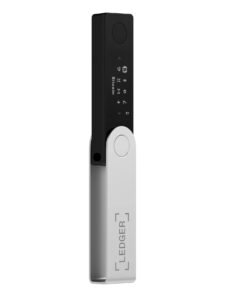Best Crypto Wallets
Buying, trading, and selling bitcoins all need cryptocurrency wallets. Traders rely on them to securely store crypto, as well as to protect and validate transaction data. Custom crypto wallets, whether hardware or software, also known as hot and cold storage, provide traders with tailored solutions not available on crypto exchanges.
- Coinbase Wallet – Best for Beginners
- Electrum – Best for Bitcoin
- Mycelium – Best for Mobile
- Ledger Nano X – Best Offline Crypto Wallet
- Exodus – Best for Desktop
2. Electrum

Because of its extensive security features and high customization, I chose Electrum as the best Bitcoin wallet.
Electrum, founded in 2011, is one of the most well-known and widely used cryptocurrency wallets today. It’s also one of the few remaining crypto wallets that only accepts Bitcoin, money for which Electrum is specifically designed. Users can change their fees depending on how long they’re prepared to wait for a transaction to be completed. The wallet has a range of robust security measures that others lack: If you pay more in fees, your transaction will be executed faster.
One of the wallet’s best features is that it runs on a light client. Light clients are simple to set up and take up less space on your computer than regular wallet clients. The wallet only downloads sections of the blockchain when utilizing simple payment verification (SPV), which speeds up transactions without compromising security.
Pros
- Setup is fast and easy.
- Other hot wallets don’t have the same level of security as this one.
- Transaction costs that can be customized
- Due to server arrangements, wallets do not experience any downtime.
Cons
- Only Bitcoin trading is supported.
- For novices, the setup and interface are not optimal.
- There is no customer service available via chat, email, or phone.
Other Highlights Include
- It is an open-source wallet, which means that its code can be scrutinized, which aids in the development of trust and security.
- It also has outstanding transaction fees that users can change according to how long they’re prepared to wait for a transaction to complete and various distinct sorts of user accounts.
- Cold storage integration with hardware wallets (KeepKey, Ledger, Trezor).
- Support for two-factor authentication and multi-signature.
3. Mycelium

Because of its significant focus on security and advanced transaction history information, we chose Mycelium as the best crypto wallet for mobile devices.
Mycelium is another well-known cryptocurrency wallet that focuses heavily on Bitcoin. It has long been a mobile-only software wallet and continues to be one of the top solutions for Android and iOS users, having been introduced to the market in 2008.
The wallet’s security and transaction choices are two of its most significant selling points. The software is entirely repeatable, which means its code can be reproduced and compared to the original to identify any potential security flaws, and it has many pin protection levels. Custom transaction fees with four recommended levels — low priority, standard, economy, and priority — and various other types of user accounts are available in the wallet app.
Pros
- Compatible with popular cold storage solutions (Ledger, Trezor, KeepKey).
- HD spending accounts and single address savings accounts are available.
- In-app crypto exchange and educational material Offer offline transactions.
Cons
- Hardware wallets are inherently more secure.
- It could not be evident for newcomers.
- Only Bitcoin, Ether, and ERC-20 tokens are supported.
Other Highlights Include
- Block height is a specified location in the blockchain; miner fees, which are paid to miners in the blockchain network; and inputs/outputs, which show addresses in a transaction.
- Inter-wallet interoperability via the FIO network includes some of the most well-known crypto companies.
- Payment processors, wallets, and exchanges.
- Users can employ a watch-only mode to block outgoing transactions while keeping track of their stocks and trades.
4. Ledger Nano X

Ledger X
We chose Ledger Nano X as the best offline crypto wallet because of the variety of supported currencies, excellent security requirements, and mobile trading features.
Ledger is one of the most well-known hardware wallet brands today. The Ledger Nano S, a feature-rich and highly secure cold wallet, spurred the company’s early popularity. The Ledger Nano X builds on the success of the Nano S by including a built-in battery and features like Bluetooth connectivity and improved asset management.
The Ledger Nano X is present at $119, has a 128 x 64-pixel screen for cycling through apps, and comes in a matte black finish. The wallet supports over 1,800 currencies and tokens, the most of any wallet on our list, and can manage up to 100 of them at once using the device’s apps. The Nano X can be used with the Ledger Live software on Android or iOS devices to swap crypto on the go. Its Bluetooth Low Energy connectivity may be switched off at any time.
Pros
- It can manage a large number of digital assets.
- It is built with special hardware to keep your private keys safe.
- Trading via the Ledger Live mobile app is possible thanks to Bluetooth.
- A built-in battery with 8-hour battery life is included.
Cons
- Much more expensive than other cold wallets.
- For others, Bluetooth technology may be a source of privacy concern.
- There is no touchscreen available.
Other Highlights Include
- The Secure Element chip from Ledger is a specialized chip that protects against numerous forms of assaults and is also utilized in high-end security solutions like credit cards and passports.
- The Ledger Live app may be used to lend and stake crypto to make revenue in addition to purchasing and selling it.
5. Exodus

Because of the speed of its transactions, ease of use, and diverse capabilities of its client, we chose Exodus as the best crypto wallet for desktops.
Exodus is one of the most graphically stunning and user-friendly wallets available. Exodus was originally a desktop-only wallet, but it now offers iOS and Android apps and is compatible with Trezor hardware wallets. Despite this, the wallet’s fundamental feature remains the desktop wallet application, updated every two weeks.
The number of currencies supported by Exodus is one of its most appealing features. Higher than 145 bitcoin assets are supported by the wallet, more than many other hot wallets. It includes popular meme coins like Dogecoin and Shiba Inu and established altcoins like Ether, Litecoin, Tether, and Dash.
Pros
- Over 145 crypto assets are supported.
- Trezor One and Trezor T hardware wallets are compatible.
- Allows Apple Pay users to purchase Bitcoin.
- Customer service is available 24 hours a day, seven days.
Cons
- The in-wallet crypto exchange has high transaction costs.
- Some users may be bothered by the lack of native two-factor authentication.
- There is no support for multiple signatures.
Other Highlights Include
- Fees can be customized, but only for Bitcoin transactions as of September 2021.
- A rising number of apps for live charts, crypto staking, and crypto deposits have been created to expand the wallet’s capabilities.
- It runs on a light client to speed up transactions, which means it employs SPV and doesn’t download entire blockchains.
Other Crypto Wallets
Trezor
Trezor is a well-known cryptocurrency brand that was one of the first to offer hardware crypto wallets. Both of its current models have excellent security features and can accommodate many assets.
Pros
- Trezor One and Trezor Model T are both more affordable options.
- The user interface is simple and easy to use.
Cons
- Other hardware wallets with similar features are more expensive.
- iOS devices are not supported.
Keepkey
The KeepKey, another hardware wallet, is an excellent option for individuals looking for a low-cost alternative, with a current MSRP of $49.00. It has a more attractive display and interfaces than the Trezor and Ledger wallets, making it more user-friendly. The wallet also conforms to the highest levels of security. When it comes to the most excellent offline wallet, KeepKey, like the Trezor versions, was outclassed in some respects.
Pros
- Hardware wallet with a reasonable price
- QR codes can be displayed on the device.
Cons
- Supports just a certain number of coins.
- It’s more expensive than similar-priced competitors.
5 Best Crypto Wallets
Thank you very much for reading this article. If you need any information related to this article, you can tell us through the comment box. Do share this article with your friends or relatives. Thanks once again.
What is Crypto Wallets?
Crypto wallet is traders keep the secure digital codes required to connect with a blockchain in cryptocurrency wallets or simply crypto wallets. Despite what their name suggests, they don’t actively store your cryptocurrencies.
Which crypto wallets has lowest fees?
There is no single static fee for every wallet. Transaction fees for crypto wallets vary depending on the exchanges utilized for trading. Some wallets let users pay additional costs to expedite transactions.





